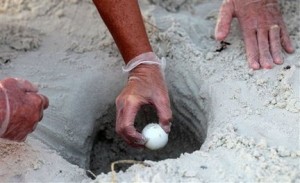
9 July 2010
PORT ST. JOE, Fla. — Biologist Lorna Patrick dug gingerly into the beach today, gently brushing away sand to reveal dozens of leathery, golfball-sized loggerhead sea turtle eggs.
Patrick, of the U.S. Fish & Wildlife Service, carefully plucked the eggs from the foot-deep hole and placed them one-by-one in a cooler layered with moist sand from the nest, the first step in a sweeping and unprecedented turtle egg evacuation to save thousands of threatened hatchlings from certain death in the oiled Gulf of Mexico.
After about 90 minutes of parting the sand with her fingers like an archaeological dig, 107 eggs were placed in two coolers and loaded onto a FedEx temperature-controlled truck. They are being transported to a warehouse at Florida’s Kennedy Space Center where they will incubate and, hopefully, hatch before being released into the Atlantic Ocean.
The effort began in earnest along Florida’s Panhandle, with two loggerhead nests excavated. Up to 800 more nests across Alabama and Florida beaches will be dug up in the coming months in an attempt to move some 70,000 eggs to safety.
Scientists fear that if left alone, the hatchlings would emerge and swim into the oil, where most would likely die, killing off a generation of an already imperiled species.
“This is a giant experiment,” said Jeff Trindahl, director of the National Fish and Wildlife Foundation, which helped organize the plan.
Trindahl acknowledged many of the hatchlings may die from the stress of being moved, but he said there was no other option.

Each nest is monitored from the moment it is made and left in place for about 50 days. Then the eggs will be taken to the NASA temperature-controlled warehouse, kept at roughly 85 degrees, where they should begin hatching within about 10 days or so of arrival. The hope is that the ones that survive will return to nest where they were born after about 30 years, but no one knows if the experiment will be successful.
FedEx has offered to transport the eggs free of charge.
Virginia Albanese, CEO of FedEx Custom Critical, said the company will continue the effort for about four months, averaging three 500-mile trips a week from the Panhandle to Cape Canaveral. By mid-July, the company expects to be making six trips a week in its 53-foot customized 18-wheeler.
The special coolers, manpower and other expenses associated with the plan could cost the federal government, the Florida Fish and Wildlife Conservation Commission and private partners hundreds of thousands of dollars, which BP will be asked to pay for, said Thomas Strickland, assistant secretary of the U.S. Interior Department’s division of Fish and Wildlife and Parks.
“It’s a major rescue effort and it’s unprecedented,” Strickland said. “There’s anxiety and there should be because it’s a delicate operation.”
Loggerhead turtles typically lay about 125 eggs per nest. The government has no way of knowing exactly how many of the species live in the Gulf, but use nest numbers to determine population health.
Fish and Wildlife has proposed increasing loggerhead protections under federal law from a threatened species to an endangered species, largely because nest numbers have been steadily declining over the years.
Even without an oil spill, the vast majority of hatchlings don’t make it to maturity, in part because they’re eaten by predators. Experts estimate about one out of 1,000 survive to reproduce.
Sea turtles have also suffered because of commercial fishing and habitat loss. Some obviously oiled turtles have washed ashore since the April 20 Deepwater Horizon rig explosion, while other dead turtles have showed no outward signs of crude.
Recent tests by the federal government indicate some likely drowned in fishing nets, possibly during emergency shrimping seasons opened before the oil reached Louisiana and Mississippi shorelines.
David Godfrey, executive director of the Florida-based Sea Turtle Conservancy, said he was hoping for a 50 percent hatch rate for the evacuated eggs.
“Any turtles that survive is a great success because we know they’re doomed over here,” he said.
(Associated Press Writer Brian Skoloff authored this report.)
Share on digg





